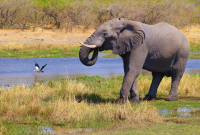Support strong Canadian climate journalism for 2025
A Canadian MP is working alongside climate advocacy groups to have a Vancouver oil and gas company’s listing on the Toronto Stock Exchange (TSX) suspended in the face of environmental and human rights concerns.
In a letter addressed to the TSX Venture Exchange sent Thursday, NDP MP Niki Ashton, alongside Climate Action Network Canada, Oil Change International, Earthlife Namibia and others, urged the country’s largest stock exchange to suspend the listing of Reconnaissance Energy Africa (ReconAfrica) owing to the “ongoing ecological, cultural, human rights, and climatic impact” of its operations.
“If the shareholding is allowed to proceed, the significant environmental and human rights impacts outlined in this letter could substantially increase; therefore, we believe that it is in the public interest to suspend the share listing,” the letter reads.
The letter outlines how ReconAfrica has used its share listing to raise $6.5 million to finance its operations. The letter also describes alleged human rights issues and a pattern of concerning corporate behaviour. It points to media reports from National Geographic detailing Namibian environmental advocates fearing for their lives and references lawsuits filed against ReconAfrica for allegedly misleading shareholders.
ReconAfrica did not immediately return a request for comment. The TMX Group, which owns the TSX, declined to comment.
ReconAfrica is drilling for both billions of barrels of oil and trillions of cubic feet of gas in an ecologically sensitive area spanning Namibia and Botswana. The company holds millions of acres worth of exploration licences in an area where the Okavango River flows, an important water system that feeds the Okavango Delta. In 2014, the Okavango Delta was added to the list of UNESCO World Heritage sites due to its ecological and cultural significance to the San people.
“It is one of the very few major interior delta systems that do not flow into a sea or ocean, with a wetland system that is almost intact,” reads the description from UNESCO. “The Okavango Delta is home to some of the world’s most endangered species of large mammals, such as the cheetah, white rhinoceros, black rhinoceros, African wild dog and lion [sic].”
It’s also one of the last remaining homes to endangered savanna elephants, whose population has fallen dramatically due to poaching and wrecked habitats from natural resource extraction.
“Looking at the fact Namibia is a dry country, the [Okavango River] flows throughout the year; it's the place where we should be putting our focus on food security for the country,” Namibian climate activist Ina-Maria Shikongo previously told Canada’s National Observer. “But instead, the water is being poisoned so a Canadian company can make profits.
“For us who'd like to see a different kind of development that is inclusive of Indigenous people and Indigenous knowledge, where we really build a country that focuses on developing the (UN sustainable development goals), that is being taken away from us.”
A ReconAfrica spokesperson previously told Canada’s National Observer its exploration licences prohibit drilling within the most ecologically sensitive areas and that it would “self-impose” additional buffers to avoid sensitive areas.






Comments
Ah- what an interesting tactic to stop exploitative and quasi criminal predatory capitalism. I applaud the initiative and if it should be successful, further de-listings for genuine cause, should be pursued. It is a promising way to clean up exchanges that have been corrupted to the point that they are little more than gambling dens.
It's a "novel" approach ... but I'm confused as to why, and under what aegis.
It seems that reasons for involuntary delisting don't include any of the considerations noted above.
It would seem likely to bring the issue to the brief attention of a relatively small number of people ... but as for succeeding with the stated mandate, it looks like a no-flyer.
There *could* be legislation (or maybe regulations) that might rein in the behaviours of such companies, but our governments have seemed more than unwilling to rein in their own climate-destroying behaviours, let alone corporations operating abroad.
The exception to all the above could be any fraudulent representations made by the company to its shareholders. Investors' (and by extension, shareholders') rights have become sacrosanct over the past 50 years -- but they mainly apply to maximizing investors' income (after that of executives', that is).